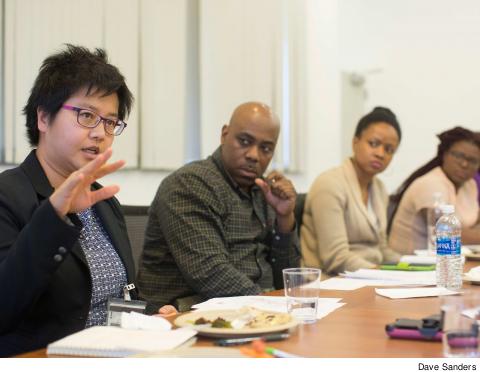A win from the new contract
 |
The PSC contract with CUNY ratified last summer has a big new benefit for certain higher education officers – a $2,500 salary differential. Now, scores of members are organizing to ensure that this feature becomes a reality.
HEOs from several campuses are learning the nuts and bolts of implementing a contract, and in turn, stepping up their own involvement with the union. PSC HEO Chapter Chair Andrea Vásquez has helped train more than 80 chapter members who will serve on new HEO labor-management committees at their respective campuses. These HEOs are learning about the new provisions and devising ways to assist HEOs applying for the differential.
ESTABLISHING COMMITTEES
“We know what the gain is,” Vásquez told Clarion. “But in order for members to get it, we have to do a lot of work, to establish these committees and help them function effectively.”
HEO Associates, HEO Assistants and Assistant to HEOs at the top of the salary schedule for at least a year can apply for a $2,500 salary differential, which, as stated in the PSC-CUNY MOA recognizes “excellence in performance or increased responsibilities within the title.” The HEO labor-management committees currently being formed at campuses will have an initial say on whether an application for the $2,500 salary differential goes forward. (Chart that outlines the steps in deciding salary differentials). While the contract outlines the formation of these committees, the logistics are being worked out by individual campus committees.
Taahira Maynard, a student affairs manager at Hunter College, will be one of the three union representatives on the committee at her college. Maynard has attended a union training with the other PSC members and, she said, one of the goals for the committee is to streamline a process so applying doesn’t seem daunting.
“It’s important to help where you can to keep people informed so they know there are new provisions that they can benefit from,” Maynard said.
Maynard and the other union members on the committee have come up with ideas that will make the application process simpler, including setting two deadlines for the Spring semester and determining a time line for when initial decisions will be made. These ideas still need to be decided upon once the full committee meets with the three designees from management.
Peter Santiago, one of the PSC embers on the Kingsborough Community College HEO Labor Management Committee, wants his colleagues to be more aware of what the union does for them and how they can become more active.
“Whenever I’m in contact with members, I think that we need to have a bigger conversation,” Santiago said, noting that regular union meetings help members identify issues that need to be addressed. “We want to bring HEOs together.”
GETTING INFORMATION
One of the goals of his committee, Santiago said, is to be accessible to members so that it can answer any questions that members may have on the application. The PSC also recommends that people who qualify for these provisions email the union so a union representative can review their application before it’s submitted.
As a result of discussions in bargaining, the criteria for applying for reclassification were expanded, allowing certain long-serving HEOs to apply if the volume of work has significantly increased in a way that has transformed the scope of the job. A reorganization of duties and increased responsibilities are also criteria that can be used to support a change in job title. (Chart on how the process works.)
Cindy Bink, the director of counseling at New York City College of Technology, advises HEOs who are applying for the provisions. She tells them to assemble their documents supporting their case and to write a draft justification memo that union colleagues can review. While Bink and PSC members at other campuses have been informing members of the new provisions, Bink says college human resource departments also must step up. “They really need to do more training on this because they leave it up to the union to tell people about [these provisions],” Bink said. “It shouldn’t be the responsibility of the union; it should be the college.”

